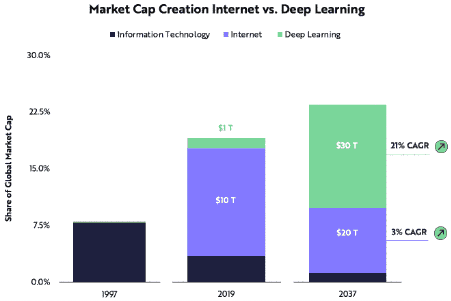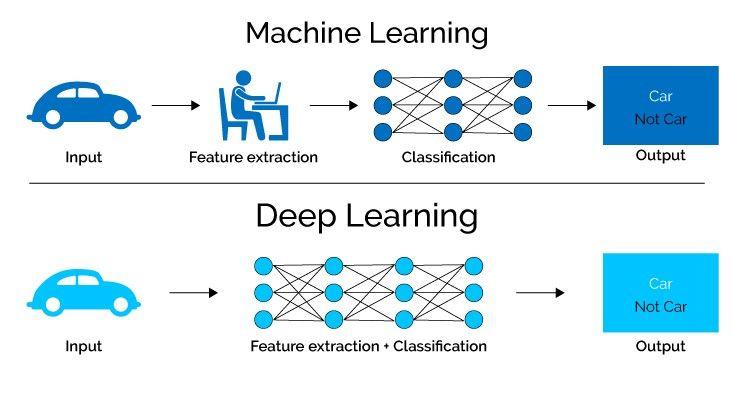'Artificial intelligence will have a more profound impact on humanity than fire, electricity or the internet’. In Alphabet CEO Sundar Pichai's vision of the world of tomorrow, AI is at the heart of everything. His thinking is certainly not uncalled for; in the wake of OpenAI's recent meteoric rise and the unprecedented adoption of AI tools around the world, the technology landscape is on the brink of a radical shift.
As the globe gears up for the AI marathon, one VIP takes center stage – Deep Learning. For investors eager to ride the wave of AI's potential, Deep Learning stands out as a key subset at the vanguard of innovation and transformation. Let’s dive into it.
Deep Learning, The Cognitive Revolution?
Deep Learning, a subset of artificial intelligence, has gained significant attention due to its ability to process large amounts of unstructured data and make sense of complex information. It first gained popularity in academic circles, but its potential came to light in 2012 when researchers achieved outstanding image recognition results using deep neural networks at the ImageNet competition. Since then, Deep Learning has become one of the most rapidly expanding technology subsets …

Modern Deep Learning models use artificial neural networks to extract features from data, allowing them to perform tasks that require human-like intelligence, such as image recognition, natural language processing, and decision making. According to ARK, Deep Learning is expected to have a profound impact on automotive, robotics, biotech, finance, and other industries, potentially unlocking trillions of dollars in productivity gains.
To put it simply, Deep Learning is like training a computer's brain to recognize complex patterns and make smart decisions. Unlike older computer programs, Deep Learning models can automatically understand intricate details and relationships in data.
Complexity and Depth: Think of Deep Learning models as having many layers, like peeling an onion (hence the term "deep"). This lets them understand complicated patterns in information. It's like looking at a puzzle with many pieces and figuring out how they all fit together.
Feature Extraction Expertise: Deep Learning is great at picking out important details from data using artificial neural networks. It's like teaching a computer to recognize specific features in images or understand different sounds in speech without someone telling it exactly what to look for.
Unstructured Data Mastery: Deep Learning is the go-to for handling messy information like pictures, sounds, or text. It's versatile and can be used in various sets of data, from face recognition in security cameras to speech recognition when talking to a virtual assistant.

Automated Smarts: One interesting aspect of Deep Learning is its knack for automated feature learning. It's like having a tech-savvy personal assistant who knows what to look for without having to be told. Deep neural networks execute all of the work automatically, in contrast to the outdated method that required human intervention to tell machines what features to prioritize. This not only streamlines the process but also turns these models into adaptable masterminds with different types of data.
Versatility Across the Board: Deep Learning is a multifaceted technology, finding applications in healthcare, finance, manufacturing, technology, and beyond. Whether it's deciphering medical images or predicting market trends, deep neural networks adapt to different challenges, making them a hot prospect for investors looking for a wide-reaching impact.
Scaling Up with Big Data: In the age of big data, where information piles up faster than ever, the scalability of Deep Learning is a game-changer. These deep neural networks are excellent at handling large datasets, offering a scalable answer to the growing demands of data processing in the fast-paced commercial environment of today.
Smart Decision-Making: The way Deep Learning learns is a bit like how we, humans, get better at things over time. Its hierarchical learning approach allows models to make smart, context-aware decisions. This is crucial in applications like autonomous vehicles, where quick and accurate decision-making is a must.
Constantly Improving: Deep Learning models are not a one-time event; instead, they continuously improve. Iterative learning allows the model to adapt and get better when new problems arise or additional data is received. It's like holding an investment that develops and improves with the shifting dynamics of the market. Like a good wine, a Deep Learning investment gets better with age.
Deep Learning as an Investment
Deep Learning is seen by investors as a true game-changer, far more than just a fad, but a disruptive force that will revolutionize industries. The sub-sector is projected to hit a $17 trillion market capitalization by 2036. For instance, in healthcare, diagnostic accuracy and productivity have never been higher, leading not only to improved patient outcomes but also cost-effective practice for providers. In finance, Deep Learning algorithms are gaining more and more value in predicting investment decisions and market trends, giving investors an edge.
The interdependence of Deep Learning has led to partnerships between tech magnates, governments, startups, and established industries. This ecosystem synergy offers intriguing investment opportunities for companies involved in strategic partnerships and mergers within the Deep Learning community. Investors who keep a close eye on such collaborative efforts might find themselves at the cutting edge of industry developments and market consolidations.
Industry | Impact of Deep Learning |
|---|---|
Automotive |
|
Healthcare |
|
Finance |
|
Manufacturing |
|
Energy |
|
Retail |
|
Companies that effectively leverage Deep Learning in these fields can gain an edge over their competitors; they will also be able to improve their operational efficiencies and build innovative solutions with significant market potential. Tesla, for example, is well-known for making maximum use of Deep Learning to strengthen their competitive advantage - Tesla's Autopilot system learns from lane markings, traffic lights and other road features. Or its Full Self-Driving (FSD) beta programme, known for its market-leading road behavior, traffic detection and precision driving.
One keyword: Adaptability. That’s what makes Deep Learning such an appealing investment opportunity, allowing investors to simultaneously tap into a wide range of businesses and industries. Over the next two decades, Deep Learning is expected to add $30 trillion to global equity market capitalization. As businesses increasingly adopt AI-driven solutions, the expanding demand for Deep Learning technology presents investments in this sector as a strategic move in line with a developing market trend.
Fundamentally, investing in Deep Learning means benefiting from the advancement of technology. It offers long-term returns, making Deep Learning more than just another investment opportunity; it’s a strategic wager on the future of technology-driven transformation.
Some Key (Investable) Players
Tech giants like Nvidia, Baidu, Google, and Amazon have played a key role in advancing Deep Learning in the past decade. However, the spotlight is now shining on emerging private players such as OpenAI, DeepMind, DeepL and Anthropic, who are making significant contributions, fuelling rapid advances in the field. These ventures are recognised for their ground-breaking contributions, adding depth to the Deep Learning story. As the technological landscape evolves, innovation in deep learning involves both established giants and agile private sector players.

Source: Source: ARK Investment Management LLC
OpenAI: Unlocking AI's Full Potential
Let's start with the obvious: OpenAI is unquestionably at the forefront of Deep Learning. Founded in December 2015 as a non-profit AI research lab, OpenAI has grown to become the world’s leading artificial intelligence powerhouse. OpenAI's notable contributions include the development of GPT (Generative Pre-trained Transformer) models, such as GPT-3 and the recently unveiled GPT-4, which have demonstrated unprecedented capabilities in natural language understanding and generation.
Key Figures and Data:
Founders: Sam Altman, Greg Brockman, Ilya Sutskever, John Schulman, and Wojciech Zaremba
Focus: Building and directing artificial intelligence in ways that benefit humanity as a whole, with a long-term focus on fundamental advances in AI and its capabilities
Notable Projects: GPT-3, the third iteration of the Generative Pre-trained Transformer, and GPT-4, a large multimodal model that accepts image inputs and has demonstrated unprecedented capabilities in natural language understanding and generation
Investment: Microsoft, Thrive Capital, Sequoia Capital, Tiger Global
DeepMind: A Journey into AI Excellence
DeepMind, acquired by Alphabet in 2015 for $400 million, is a leading AI research lab known for its groundbreaking work in Deep Learning. DeepMind’s dedicated teams work with external experts and communities to improve AI safety through thorough evaluation, identification of risks, and the development of appropriate safety mitigations and ethics considerations. DeepMind's AlphaGo made headlines by defeating a world champion Go player in 2016, showcasing the power of Deep Learning in strategic decision-making.
Key Figures and Data
Founder: Demis Hassabis, Mustafa Suleyman, Shane Legg
Focus: Developing advanced AI systems and technologies, with a mission to "solve intelligence" and a strong emphasis on long-term research efforts and the development of general-purpose learning
Notable Project: AlphaGo, AlphaCode
Investment: Google, Founders Fund, Horizons Ventures
DeepL: Bridging Language Gaps with AI
DeepL is a name that might resonate with many. The German-based AI company is revolutionizing language translation through their DeepL Translator. Launched in 2017, DeepL's neural network-driven translation models have gained recognition for their accuracy and natural language fluency.
Key Figures and Data:
Founder: Jaroslaw Kutylowski
Focus: Providing high-quality and accurate translations for individuals and businesses, leveraging AI and neural network technology
Notable Product: DeepL Translator
Investment: Atomico, Bessemer Venture Partners, IVP, World Innovation Lab
Anthropic: Shaping the Future of AI
Founded in 2021 by former senior members of OpenAI, Anthropic is an AI safety and research company that focuses on developing large-scale AI systems to study their safety properties at the technological frontier. Anthropic has developed the Claude 2 chatbot, competing with OpenAI's ChatGPT and used by companies like Slack, Notion, and Quora. Anthropic's approach to AI safety involves the concept of "constitutional AI," which entails using Deep Learning to create a custom set of principles to guide the behavior of AI systems, making their values easier to understand and adjust as needed.
Key Figures and Data:
Founders: Dario Amodei, Daniela Amodei
Focus: Research and development in artificial general intelligence
Notable Product: Constitutional AI (CAI), Claude
Investment: Google, Amazon, Salesforce Ventures, Zoom Ventures
The Bottom Line
Deep Learning is an ever-evolving, extremely significant area of artificial intelligence. Ongoing developments, such as memory networks and generative networks, hint at the potential for Deep Learning to become even more sophisticated, pushing AI forward all at once.
Hence, in our view, Deep Learning clearly emerges as a hub of disruptive innovation, a cornerstone of growth. We truly believe in its potential as the driving force of AI, with the potential to transform entire industries from every angle, resulting in trillions in revenue. This is a unique opportunity for investors to take a front row seat in the fourth industrial revolution.
At Acquinox Capital, we firmly believe in the transformative potential of foundational technologies that reshape the world. We are not merely analyzing trends; we actively seek out high-growth gems in cutting-edge sectors that are often overlooked by conventional methods.
Ready to dive into the dynamic realm of Deep Learning and set the stage for your assets to thrive in a constantly evolving landscape? Connect with us, and one of our advisors will be delighted to share insights, explore the tremendous potential of Deep Learning, and discuss the exciting opportunities that await.
Published by Samuel Hieber

